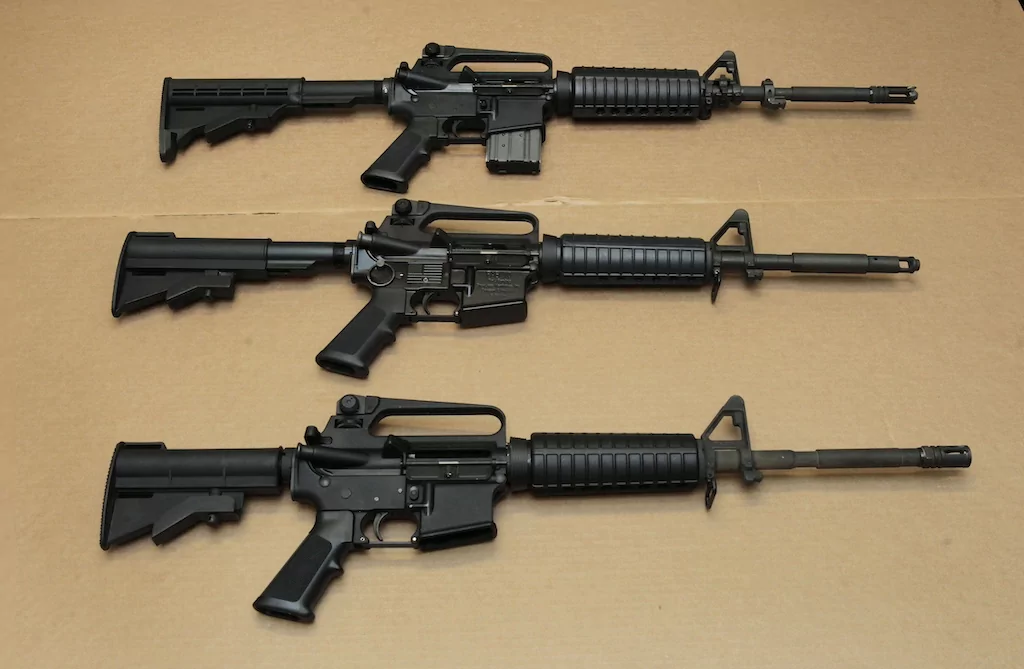
A pro-gun group asked the Supreme Court on Wednesday to weigh a challenge to Maryland‘s ban on assault-style firearms, commonly referred to as “assault weapons,” after lower courts rejected efforts to overturn the state’s 2013 law.
The Firearms Policy Coalition is fighting against the 2013 law that classifies numerous semiautomatic weapons as illegal “assault weapons.” Earlier this month, the full U.S. Court of Appeals for the 4th Circuit split 10-5 in a ruling that upheld the law despite efforts by pro-gun litigants to utilize a recent landmark Second Amendment ruling that some believe would result in the nullification of gun control laws.

“Through this case, the Court can and should make explicit how lower courts should address unconstitutional bans on so-called ‘assault weapons’ and similar laws,” FPC president Brandon Combs said in a statement.
The Maryland law was initially passed in response to the 2012 shooting at Sandy Hook Elementary School in Connecticut, where a shooter used a Bushmaster AR-15 assault rifle to kill 20 children and six adults. Vice President Kamala Harris’s running mate, Gov. Tim Walz (D-MN), a proponent of stricter gun laws, has touted his belief that civilians should not be able to possess weapons like the ones he trained with during his time in the National Guard.
But roughly 1-in-20 people in the United States own an AR-15, according to a 2023 Washington Post-Ipsos poll. That data suggest that with a U.S. population of 260.8 million adults, around 16 million residents own an AR-15, making it the most popular rifle in the U.S.
The challenge to the Maryland law, known as Snope v. Brown, has cycled between appeals courts and the Supreme Court ever since the 2022 landmark Supreme Court ruling Bruen v. New York Rifle & Pistol Assn., which set a test for courts to prove a gun control measure is consistent with the nation’s “history and tradition” of firearms regulations.
Shortly after the 6-3 majority ruling in Bruen was released, the Supreme Court remanded the case back to the 4th Circuit for further consideration in light of the new “historical analogue” precedent. The case, previously known as Bianchi v. Frosh, again rose up to the nine justices earlier this year, but the Supreme Court denied review, citing the then-pending dispute before the 4th Circuit.
Circuit Judge J. Harvie Wilkinson III, an appointee of former President Ronald Reagan, wrote in the court’s majority opinion that the weapons covered under the ban are “designed for sustained combat operations that are ill-suited and disproportionate to the need for self-defense.”
But the five dissenting judges on the appeals court argued that the Second Amendment is not a “second-class right.”
“Appellants seek to own weapons that are indisputably ‘Arms’ within the plain text of the Second Amendment,” Circuit Judge Julius Richardson, a Trump appointee, wrote in the dissent. “While history and tradition support the banning of weapons that are both dangerous and unusual, Maryland’s ban cannot pass constitutional muster as it prohibits the possession of arms commonly possessed by law-abiding citizens for lawful purposes.”
Democratic Maryland Attorney General Anthony Brown, who has defended the law in court, said earlier this month that the 4th Circuit decision “will save lives,” adding that “access to weapons of war that have no place in our communities causes senseless and preventable deaths.”
Now that the 4th Circuit recently ruled on the dispute, FPC and other plaintiffs, such as Maryland gun owner David Snope, believe the justices should clarify whether the 2013 law passes the high court’s Second Amendment test.
CLICK HERE TO READ MORE FROM THE WASHINGTON EXAMINER
“There is no legitimate basis for the Fourth Circuit to have concluded that the most widely owned semiautomatic rifles in the United States are not ‘Arms’ protected by the Second Amendment,” the FPC’s president said.
The Washington Examiner contacted Brown’s office for comment.




